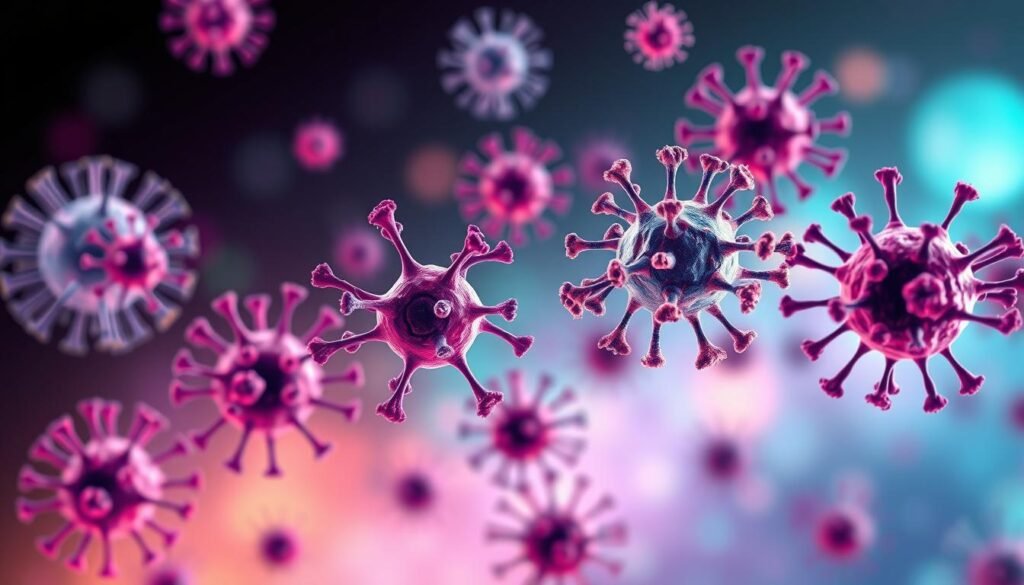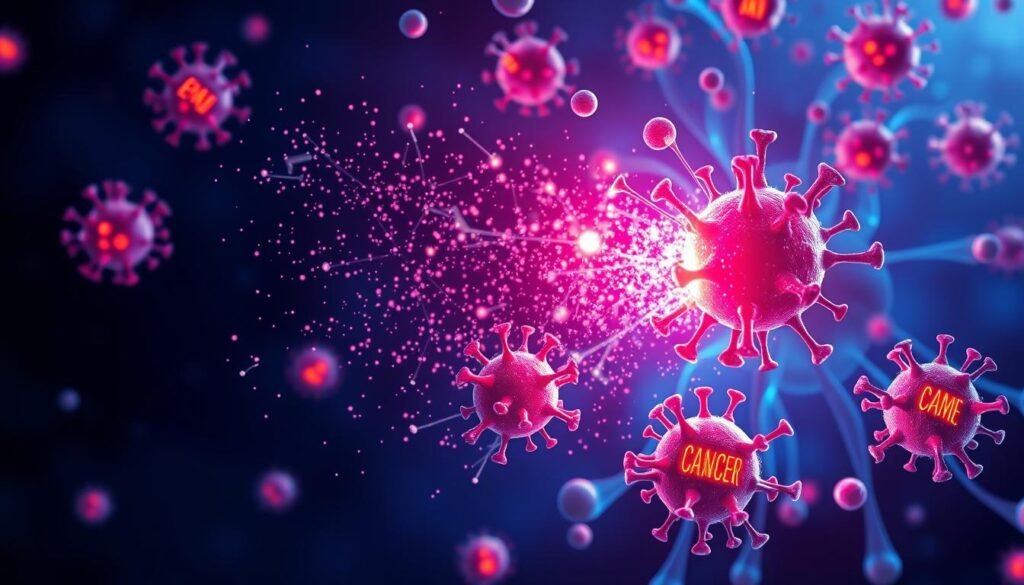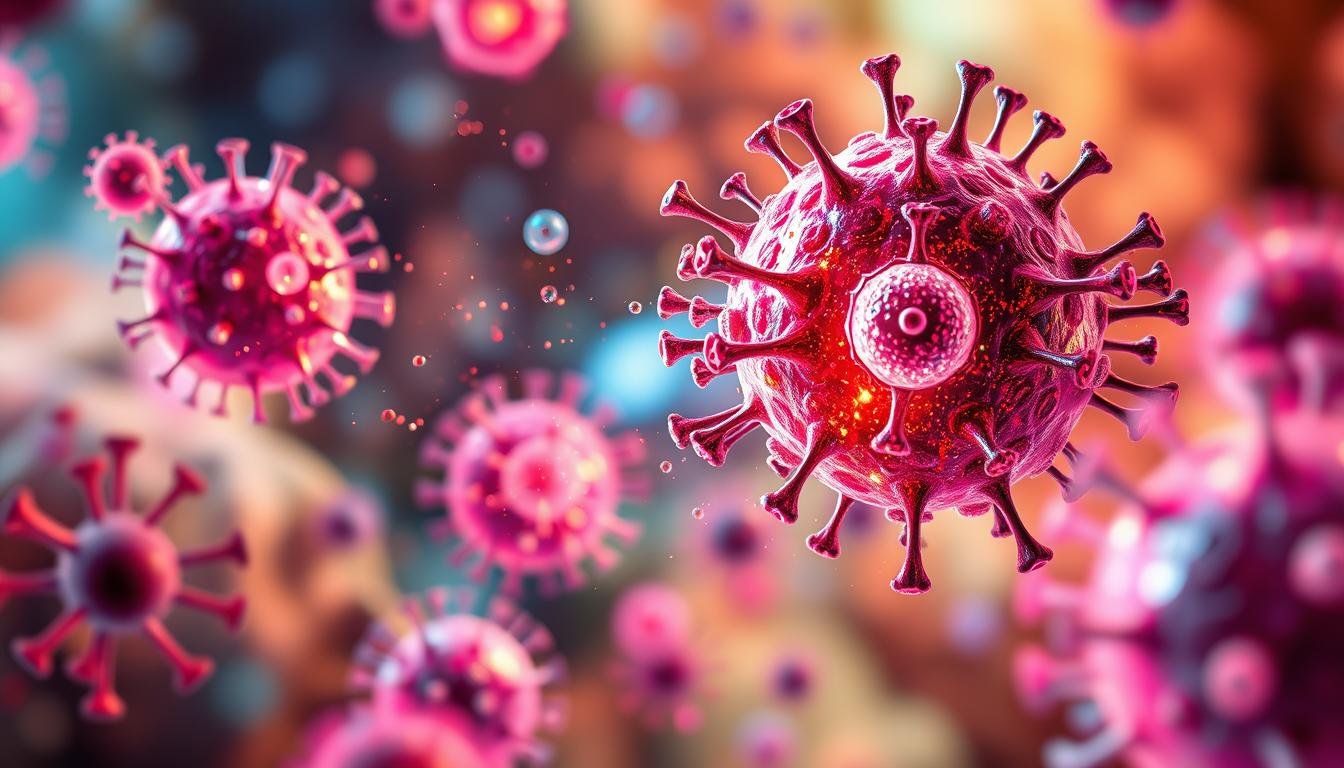In a small research lab in the city, scientists were close to a big discovery. They had been studying the human immune system for years. They wanted to find out how it could fight cancer.
Their work was driven by a strong desire to unlock the body’s defenses. This would soon change how we treat cancer.
The idea started with a simple question: could we use the immune system to fight cancer? This idea, once seen as radical, has become a reality. It’s called cancer immunotherapy1. This approach uses the body’s cells and molecules to fight cancer, offering new hope to patients.
At the core of this change is understanding how the immune system and cancer cells interact. The tumor microenvironment (TME) is key in this interaction1. Immune checkpoint pathways, like PD-L1/PD-1 and CTLA-4, help the immune system fight cancer cells. By targeting these pathways, immunotherapy aims to make the immune system more effective against cancer.
The progress in cancer immunotherapy is amazing1. Cell-based therapies, like CAR-T and CAR-NK, have shown great results against hard-to-treat cancers1. Monoclonal antibodies, made in labs, are also powerful tools against cancer1. Personalized treatments, using tumor neoantigens, are expanding the possibilities of immunotherapy, making treatments more effective.
Key Takeaways
- Cancer immunotherapy uses the immune system to fight cancer, changing how we treat it.
- The tumor microenvironment (TME) and immune checkpoint pathways are important in the fight against cancer.
- Advances in cell-based therapies, monoclonal antibodies, and personalized treatments have improved cancer treatment outcomes.
- Immunotherapy is a promising new way to treat cancer, possibly more effective than traditional methods.
- Research continues to make immunotherapy even better, aiming to help more patients and manage side effects.
Understanding the Revolution in Cancer Treatment
The field of cancer immunotherapy has seen a huge change, changing how we treat cancer. It started with early tests using Coley’s toxins and has grown to include targeted treatments. The immune system, with its complex ways of fighting off diseases, is now a key player in cancer battles. T-cells, in particular, are crucial in the body’s fight against cancer2.
The Evolution of Immunotherapy Approaches
Immunotherapy has made big strides in recent years. Checkpoint inhibitors like anti-PD-1 and anti-CTLA-4 antibodies have been introduced. These therapies have shown great success in making T-cells attack tumors, improving treatment results for many cancers2.
Key Components of the Immune Response
The immune system’s adaptive and innate parts work together to fight cancer. T-cells, a key part of adaptive immunity, can spot and destroy cancer cells2. Natural killer cells and cytokine signals also play important roles in the fight against cancer.
Breakthrough Developments in Treatment
Immunotherapy has seen many major breakthroughs. CAR-T cell therapy, a custom treatment that makes a patient’s T-cells target cancer, has shown great success in blood cancers. It’s also being looked at for solid tumors3. Personalized neoantigen vaccines and new diagnostic tools like the xCELLigence RTCA system and SureSelect Cancer All-in-One assays are making treatments more precise and effective2.
| Breakthrough Developments | Impact |
|---|---|
| CAR-T Cell Therapy | |
| Personalized Neoantigen Vaccines | |
| Diagnostic Tools |
These advancements have changed cancer treatment, bringing new hope and better results for patients234.
Cancer Immunotherapy: Principles and Mechanisms
Cancer immunotherapy uses the body’s natural defenses to fight disease. It aims to boost the immune system’s power to find and destroy cancer cells5. Thanks to new discoveries, we now have better ways to treat cancer5. The immune system is key in stopping tumors from growing and spreading5.
The main ideas behind cancer immunotherapy include making T-cells stronger, focusing on specific cancer markers, and beating immune suppression. T-cells need three signals to work: finding the antigen, getting co-stimulation, and getting cytokine signals. But, tumors can hide from the immune system in many ways5.
Tumors can hide by not showing their antigens to T-cells. They also use immune checkpoints like PD-L1 to stop T-cells from attacking. Immunotherapies try to overcome these tricks to get the immune system back on track.
Tumors also change their metabolism and bring in cells that suppress the immune system6. It’s important to understand and target these tactics to make cancer immunotherapies work better.

“In the late 19th century, surgeon William Coley reported that an injection of killed bacteria into sarcoma sites could lead to tumor shrinkage.”5
The Role of Immune System in Fighting Cancer
The immune system is key in fighting cancer7. Cytotoxic T cells find and kill cancer cells8. Natural Killer (NK) cells also fight cancer cells8. Cytokines like interferons and interleukins help control the immune response8.
T-Cells and Their Cancer-Fighting Properties
T-cell exhaustion is a big challenge in fighting cancer7. Immunotherapies try to wake up these T-cells and boost NK cell activity8.
Natural Killer Cells and Immune Response
Natural Killer (NK) cells are vital in the fight against cancer8. They can spot and kill cancer cells without needing to be sensitized. This makes them a strong defense against cancer.
Cytokine Signaling in Cancer Treatment
Cytokines like interferons and interleukins are crucial in fighting cancer8. They help coordinate immune cells like T cells and NK cells. This boosts their ability to fight cancer. Research focuses on using cytokine signaling to improve cancer treatments.
“The immune system’s ability to recognize and eliminate abnormal cells is a crucial defense against cancer. Understanding the complex interplay between the immune system and cancer is essential for developing more effective cancer treatments.”
| Immunotherapy Type | Mechanism of Action | Examples |
|---|---|---|
| Immune Checkpoint Inhibitors | Disrupt connections between proteins, allowing T cells to continue killing cancer cells | Yervoy®, Keytruda®, Opdivo® |
| Personalized Cell Therapy | Enhance the body’s own immune cells to improve their cancer-fighting abilities | CAR T-cell therapy |
| Cancer Vaccines | Train the immune system to recognize and eliminate cancer cells preemptively | Various vaccines under development |
The gut microbiome affects how well immunotherapy works7. Research is ongoing to understand the complex relationship between the immune system and cancer. This will help create more personalized and effective treatments.
Types of Immunotherapy Treatments
Cancer immunotherapy uses the body’s immune system to fight cancer9. It includes treatments like checkpoint inhibitors and personalized cancer vaccines. These options are growing fast10.
Checkpoint inhibitors, like anti-PD-1 and anti-CTLA-4 antibodies, are very promising11. They block signals that cancer cells use to hide from the immune system. This lets T cells attack tumors more effectively9.
Cancer vaccines are another key strategy10. Preventive vaccines, like HPV vaccines, have greatly reduced certain cancers10. Therapeutic vaccines teach the immune system to fight specific cancer cells10.
Adoptive cell therapies, like CAR T-cell therapy, use a patient’s immune cells to fight cancer11. These treatments have shown great results in some cancers10.
Oncolytic virus therapy uses viruses to kill cancer cells and boost the immune system10. The FDA-approved T-VEC has helped treat melanoma11.
Immunotherapy also includes cytokine therapies and targeted antibody therapies11. These treatments aim specific cancer targets, offering personalized care10.
As research advances, new ways to use the immune system against cancer are being found9. The future of cancer treatment looks very promising9.

Personalized Cancer Vaccines and Targeted Therapies
The field of cancer immunotherapy has seen a big change. Personalized cancer vaccines are now a key part of treatment. They use the immune system to find and kill cancer cells, offering a more precise treatment12.
Neoantigen Vaccines Development
Neoantigen vaccines target specific mutations in tumors. These mutations are unique to each person’s cancer. To make these vaccines, doctors use advanced tests to find these mutations13.
By focusing on these specific targets, the immune system can better fight cancer. This could lead to better and longer-lasting results13.
Monoclonal Antibodies in Treatment
Monoclonal antibodies, like trastuzumab for HER2-positive breast cancer, are very effective. They are made to attach to specific molecules on cancer cells. This helps them attack cancer cells without harming healthy cells14.
This precise method has changed how we treat cancer. It offers patients a more tailored and effective treatment option.
Bispecific Antibodies and Their Role
Bispecific antibodies are a new step in cancer treatment. They can connect cancer cells and immune cells at the same time. This is thanks to therapies like blinatumomab for acute lymphoblastic leukemia14.
These antibodies help the immune system fight cancer more effectively. They are a big step forward in using the body’s defenses against cancer.
Neoantigen vaccines, monoclonal antibodies, and bispecific antibodies show a big shift towards precision medicine in cancer treatment. By tailoring treatments to each person’s cancer, these methods promise better and safer treatments. This could lead to better outcomes for patients12.
| Personalized Cancer Vaccines | Monoclonal Antibodies | Bispecific Antibodies |
|---|---|---|
| Target tumor-specific mutations (neoantigens) | Bind to specific molecules on cancer cell surface | Engage both cancer cells and immune cells |
| Primes immune system to recognize and attack cancer cells | Deliver targeted attack while minimizing impact on healthy tissues | Trigger potent immune response against the tumor |
| Potential for more effective and durable responses | Revolutionized treatment of various cancer types | Represent advancement in harnessing the body’s defenses |
“The research suggests that personalized cancer vaccines may have applications beyond liver cancer, aiding in shrinking or eliminating tumors in various cancer types.”12
The growth of personalized cancer vaccines and monoclonal and bispecific antibodies shows big progress in cancer treatment. These new methods are making cancer treatment more personalized and effective. They give hope to patients and their families.
Challenges and Future Directions in Immunotherapy
Cancer immunotherapy has seen great success, but it faces big challenges. These include resistance to treatment, limited success in some cancers, and managing side effects. Researchers are working hard to solve these problems.
One major challenge is overcoming resistance to treatment. This includes when tumors stop showing the targets for treatment or create a shield against the immune system. Combination therapies, mixing immunotherapy with other treatments, are showing promise in making treatments more effective15.
Finding good biomarkers to choose the right treatment for each patient is key. Researchers are looking into new ways to target the tumor environment, improve T-cell movement, and change the gut microbiome to boost the immune system15.
It’s also important to manage and reduce immune-related adverse events to help patients do better. The future includes better CAR T-cell therapies, new immune checkpoints, and personalized treatments based on the tumor’s genetic changes16.
| Challenge | Potential Solution |
|---|---|
| Primary and acquired resistance | Combination therapies, targeting resistance mechanisms |
| Limited efficacy in certain cancer types | Identifying reliable biomarkers, targeting tumor microenvironment |
| Immune-related adverse events | Improved management and mitigation strategies |
As cancer immunotherapy grows, it’s crucial for researchers and doctors to team up. Together, they can tackle these challenges and make this new way of treating cancer even better16.
“The future of cancer immunotherapy lies in our ability to overcome resistance, enhance efficacy, and ensure the safety of these groundbreaking treatments.”
Conclusion
The field of17 cancer immunotherapy has changed the way we fight cancer. It brings new hope to those with cancers that were once untreatable18. This area is growing fast, with scientists exploring new ways to target cancer and improve treatments.
Despite the challenges, like making treatments work better and reducing side effects, immunotherapy is a game-changer. As we learn more about how tumors and the immune system interact, immunotherapy will play a bigger role in18 cancer treatment. This means we’ll see more treatments tailored to each patient’s needs.
The future of cancer care is bright, thanks to the immune system’s power. This could lead to better results and a better life for18 cancer patients everywhere. With ongoing research in17 immunotherapy and the growth of personalized oncology, the outlook for cancer care is promising.


